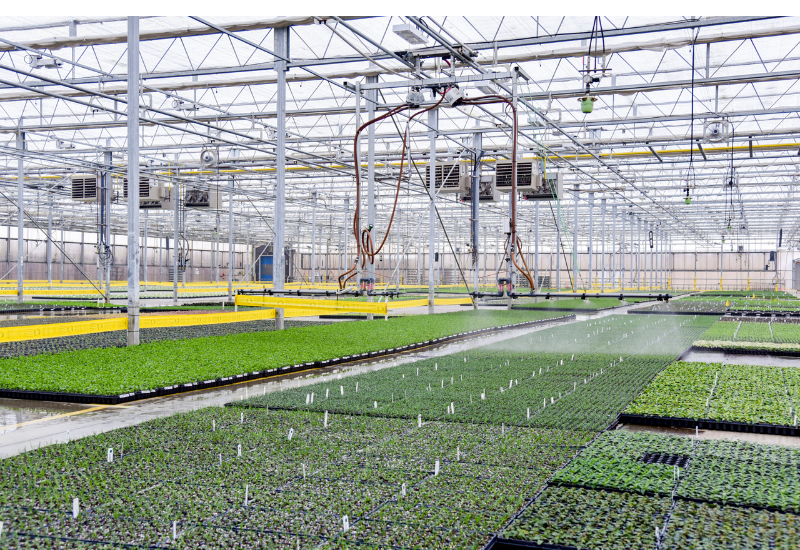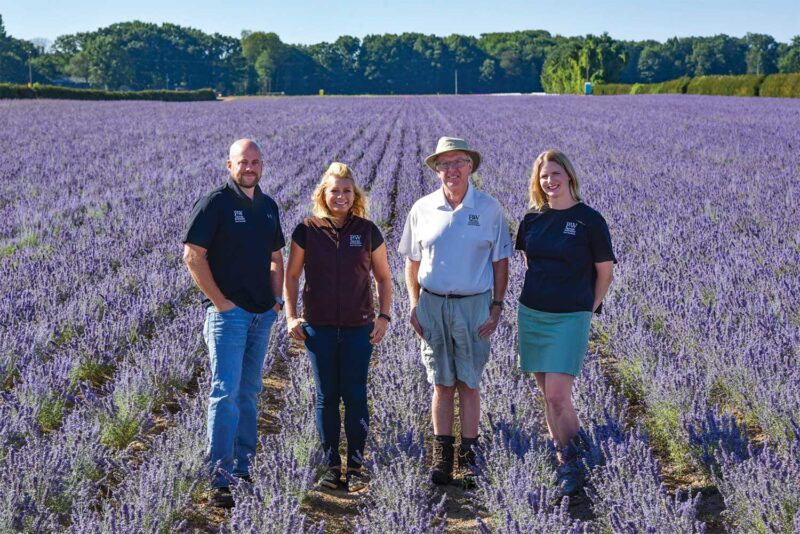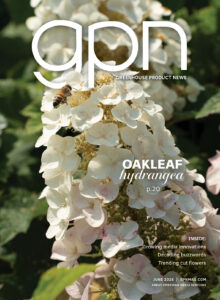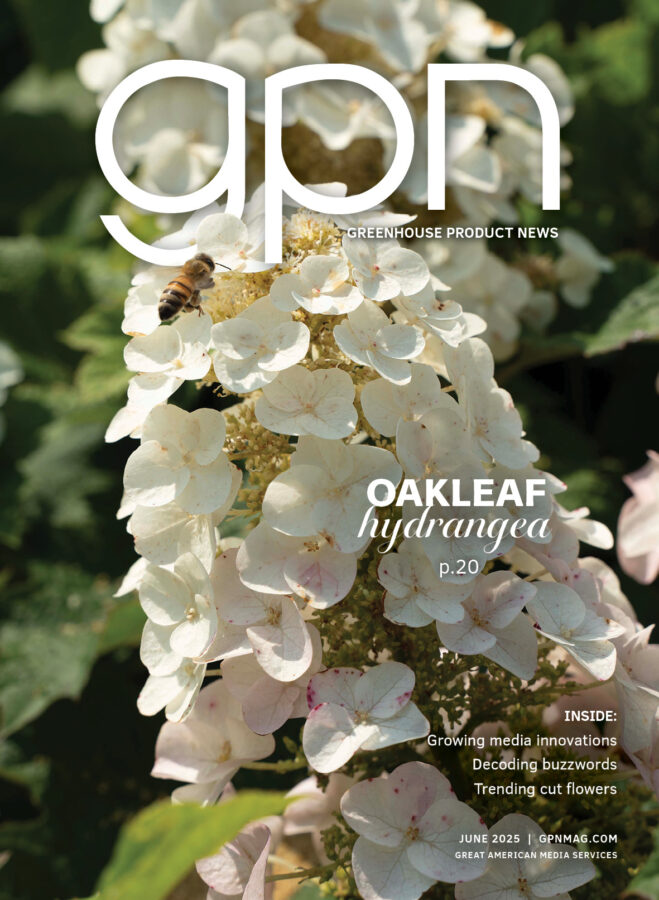
Walters Gardens: Rooted in legacy
Walters Gardens began as a five-acre farm in Zeeland, Michigan which grew perennials for local suppliers. More than 75 years later, it has grown into 1,500 acres with more than 500,000 square feet of greenhouses.

Today, sisters Karin Walters and Christa Steenwyk are leaders of the company, serving as CEO and vice president of marketing and industry relationships, respectively. While they have spent most of their life in the family business, neither thought they would one day work in horticulture. After college, both found their way back to Walters Gardens to continue the legacy started by their grandparents.
“We took it as a temporary job, thinking we would move on, but we fell in love with the industry and the business and ended up sticking with it,” Steenwyk said. “One of the things we have been working on is passing the torch from the second generation to us in the third generation. We hired a consultant several years ago to help us through the transition. It’s been challenging, but we are proud (of) how far we’ve come and will continue to work together to ensure Walters Gardens will continue to thrive.”
The sisters’ cousin, Ryan Hop, serves as chief operating officer, and their dad, John Walters, is still involved part-time.
“We try not to deviate too much from (our grandparents and parents) leadership style, but we’re different people, so obviously there’s going to be differences,” Steenwyk said. “One of the biggest changes is that my dad was really one person running the company, and we have made it more of a team effort with the three of us making the decisions together.”
From the beginning, Walters Gardens’ mission statement has been: “Raising the bar on perennials together,” and that has been something that has stayed the same through the new leadership.
“Internally, this challenged us to use collaboration and teamwork to produce excellent, quality perennials,” Steenwyk said. “We also continue to look to innovation by adopting new technologies and working smarter by better practices and improving techniques. We want to ensure the quality of our perennials meets or exceeds our customers’ expectations.”

A VAST HISTORY
It was 1942 when Dena Knoll, who had immigrated from the Netherlands and started growing plants, hired Dennis Walters to work in the fields of her family farm. At the time, Knoll ran a small perennial business that she shared with her mother and daughter, and it became known as Knoll and Walters Perennials.
Knoll’s daughter Harriet married Dennis, and he brought his four brothers into the growing operation. So, when Dena eventually retired, the company was rebranded as Walters Gardens.
The company has been growing high-quality bare root products from the beginning.
Its first greenhouse was built to help propagate small plants for early spring planting and its tissue culture lab to help clean up disease-troubled field stock.
“We started growing bare root product and we still offer jumbo, fast-finishing bare root product that our customers continue to love,” Steenwyk said. “Throughout the years, we’ve evolved by adding a plug line and building greenhouses. That’s now grown to 18 acres. We invested in a breeding program and now have introduced hundreds of perennials to the market. We also teamed up with Proven Winners and are proud to be part of the No. 1 plant brand in our industry.”
The company sells products in the U.S. and Canada, and works with licensees throughout the world with its plant genetics.
“Our customers look to us for our exceptional genetics which have proven themselves over the years, from our distinctive hostas to our fabulous hardy hibiscus and many others,” Steenwyk said. “The top exclusive genetics from our own hybridizing program and hybridizers worldwide are trialed and selected for the Proven Winners line.”
Thanks to its location along Lake Michigan, the company utilizes sandy, well-drained soil that helps its roots grow bigger faster. The sandy loam soil, moderate Zone 5 temperatures and semiconsistent snow cover create perfect growing conditions.
While most varieties are cultivated for a single season, hemerocallis and hosta varieties are grown for two seasons. During harvesting, the majority of the soil is removed and the tops of most varieties are trimmed back to the crown. They are then graded, packed in shredded aspen or sphagnum moss and stored in freezers until it’s time for shipment.

PLANT DEVELOPMENT
Hans Hansen is the company’s director of new plant development and, for more than a decade, has been a driving force behind the company’s numerous plant introductions.
Under Hansen’s leadership, Walter Gardens’ New Plant Development department works on projects involving more than 80 plant genera annually, which results in more than 35,000 unique crosses each year. While many seedlings are quickly eliminated at the onset, thousands make their way to landscape trials.
In addition to the expectation of better landscape and production performance, each breeding project is approached with genus-specific goals. Plus, by honing specific characteristics through multiple generations of breeding, the company is able to discover unique introductions that improve upon market standards.
“Our commitments to high-quality plants and genetics have led to an expansive collection of Walters Gardens-introduced varieties and a close relationship with the Proven Winners brand,” Steenwyk said. “We produce almost 20 million perennial plants a year now, a big step forward from 1946. We haven’t lost sight of our roots or the values that made this company what it is. Through a lot of hard work and determination, Walters Gardens has grown to what it is today.”
TTA’s FlexSorter is an automatic selecting line that can sort and transplant into various grades.
TECH TALK
Over the years, Walters Gardens has invested in technology when it made sense, resulting in operational improvements.
For instance, it recently invested in a flex sorter machine, which has enhanced its sorting process.
“Additionally, we are upgrading our field technology, including new tractors that our in-house technicians customize for our specific digging requirements,” Steenwyk said. The tractors are equipped with GPS to streamline the process and staff technicians retrofit tractors to fit digging needs. Investments continue in technologies and equipment that keep costs down and production rates up, she said.
A number of years ago, the company also developed a custom inventory program because it couldn’t find an existing system that worked well.
“We’re doing some pretty big upgrades to that program now, and that’s one of the things we are focusing on now to help us work smarter and be more efficient,” Steenwyk said.
SUSTAINABLE EFFORTS
Sustainability is important to Walters Gardens, and the company continues to focus on doing what’s best for the environment.
“We do several cool sustainability practices in our fields and are continuing to enhance them,” Steenwyk said. “For instance, we repurpose soil from our bare root production and our greenhouse and apply it to our fields.”
The farm also has perennial crops on rotation and uses sustainable practices to get fertility back in the soil.
“We use oats, rye and triticale in the fall and sorghum sudan grass as our summer cover,” Steenwyk said. “We also use a beneficial program in our greenhouse and fields and are continuing to try to improve that program.”
THE ROAD AHEAD
Since its founding in 1946, Walters Gardens has remained committed to the core values established almost eight decades ago.
“Our focus is on delivering top-quality perennial products and superior genetics to the market,” Steenwyk said. “To ensure our continued success and longevity, we are dedicated to working efficiently and maintaining profitability. We also prioritize investing in and valuing our dedicated employees, as they are integral to our future growth and sustainability. We have a strong team that helps us produce some of the best quality perennials on the marketplace.”











 Video Library
Video Library 


















